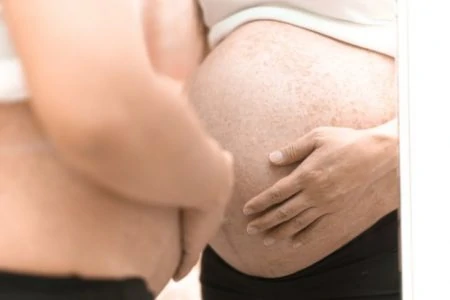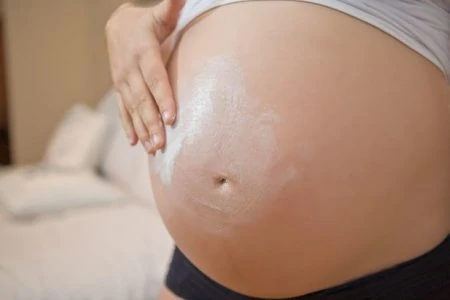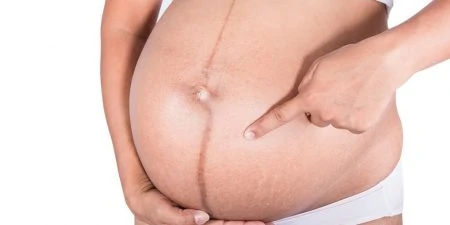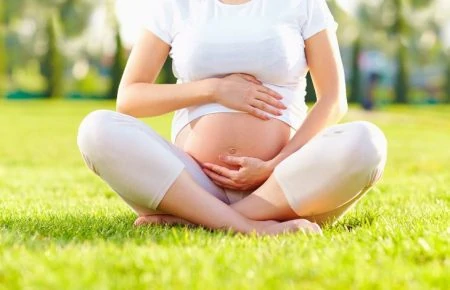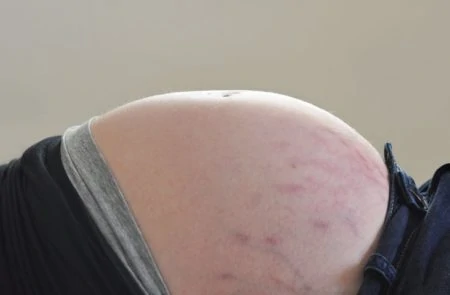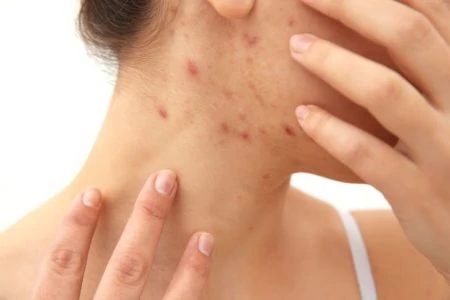Do you find yourself waking up at night to scratch more times than you do to hit the bathroom?
We know firsthand how many changes our bodies undergo during pregnancy — some more unexpected than others. We expand, our hair gets thicker, and yes, our skin often gets itchier.
What is all that itchy and dry pregnancy skin about? Does it mean something specific when certain body parts itch? Can it be a sign of a more serious condition?
In this article, our medical experts will answer these questions and more. We’ll help you find that much-needed relief for your itchy skin during pregnancy.
Key Takeaways
- Pregnancy can cause itchy skin due to hormonal changes, increased blood supply, and skin stretching.
- Common itchy areas include belly, breasts, eyes, and underarms, but severe itching on hands and feet may indicate a serious condition.
- Obstetric cholestasis, a liver condition in late pregnancy, can cause severe itching and requires medical attention.
- To alleviate itchiness, stay hydrated, moisturize, avoid hot baths, and wear loose clothing.
Decoding the Itchy Spots
So, you’ve heard of your belly itching during pregnancy — but have you ever heard of itchy underarms or eyes? Believe it or not, it can happen! Feeling itchy in some places during pregnancy is entirely normal, but feeling it in others can be cause for alarm.
Pay attention to the severity of the itching. Although mild itching is expected and common in pregnancy, you and your doctor should investigate further if it gets too severe to bear.
Editor's Note:
Dr. Njoud Jweihan, MDOne way to understand why you’re itching is to look at the specific areas where the urge to scratch is strongest.
1. Belly
An itchy belly might be the least surprising itch during pregnancy — after all, it’s where we experience the most visible change.
Not only do the high levels of estrogen in your body make you itch, but increased blood supply to the skin can also cause itching.
Your belly is growing and expanding to accommodate your new baby. As that happens, your skin will lose elasticity and moisture, possibly causing it to become dry and itchy (1).
2. Breasts
Itchy breasts are common and might be one of the first symptoms of pregnancy. This is due to hormone level changes that occur after ovulation and continue to develop as your pregnancy progresses.
As you go through your pregnancy, tissue growth, which can lead to dryness, and increased blood flow to the breasts can also cause them to itch or even hurt.
3. Eyes
Itchy eyes during pregnancy might be something you never considered, but the good news is it’s completely normal. Dry eye syndrome is an actual condition that occurs when the hormonal changes in your body cause your eyes to produce fewer tears. During pregnancy, extra water retention can also spread to the eyes and cause a general feeling of skin tightness and itchiness.
This leaves your eyes feeling dry and itchy and can even cause you to experience moments of blurred vision.
4. Underarms
While this can be annoying, especially if you are pregnant in the summer and want to wear sleeveless tops, experiencing itchy underarms during pregnancy is completely normal.
Hormonal changes can trigger skin irritation. Pregnant women are also more prone to yeast infections, which can occur in your underarms and cause swelling and itching (2).
5. Hands and Feet
Itchy hands and feet during pregnancy can not only be annoying, but they may also be dangerous. If your itching is mild and occurs during the early to mid-stages of your pregnancy, chances are it’s safe and healthy.
If the itching primarily includes the palms and soles, becomes more intense — especially at night, or comes on suddenly in the third trimester, it could be obstetric cholestasis, a much more serious condition (3).
When Itching May Be Serious
Most pregnancy itching is entirely normal and not cause for concern.
However, there are times when itching can be a symptom of larger issues and might require a doctor’s supervision to manage.
1. Obstetric Cholestasis
Obstetric cholestasis is a condition that occurs in the late stages of pregnancy, usually the third trimester. It occurs when your liver cannot handle your increased hormone levels, causing it to stop functioning correctly and not release bile as it should.
While we don’t yet know the precise causes, some experts believe it happens because a pregnant woman’s rising progesterone and estrogen levels overwork the liver. These hormones are at their highest levels during the third trimester, when cholestasis often occurs. This causes the levels of bile in the blood to increase and deposit under the skin, resulting in severe itching.
Other symptoms of obstetric cholestasis include:
- Jaundice, or yellowing of the skin.
- Darkened urine.
- Pale-colored bowel movements.
- Fatigue.
- Depression.
- Loss of appetite.
- Nausea or vomiting.
- Pain in the upper right quadrant, with no signs of gallstones.
- Absence of rash.
Severe itching in obstetric cholestasis can also occur anywhere on the body. Contact your doctor right away if you experience severe itching — especially in your hands and feet. Cholestasis is a serious condition that can result in fetal distress, preterm labor, and even stillbirth. Many believe the effect on the baby is due to the high bile salts in the blood, making the uterus more sensitive to the hormone oxytocin, which is responsible for uterine contractions.
Editor's Note:
Dr. Njoud Jweihan, MDIf your doctor determines you have obstetric cholestasis, they will monitor your liver enzymes carefully throughout the remainder of your pregnancy. Obstetric cholestasis can also affect your absorption of vitamin K, the vitamin responsible for blood clotting, and your doctor might offer you a vitamin K supplement. If the condition gets too serious, they might determine that it’s necessary to induce you early for your baby’s safety (4).
2. PUPPP
Pruritic urticarial papules and plaques of pregnancy (PUPPP) is a condition that occurs in roughly 1 in 150 pregnancies (5). It’s a rash that usually begins on the belly, in or around stretch marks, and spreads to other areas such as the back, legs, buttocks, and arms within a few days. The face is usually spared. It also usually occurs later in pregnancy or even after delivery.
No one knows exactly what causes PUPPP, but there are several theories.
Some researchers believe it’s due to skin stretching and rapid weight gain. Others think it’s caused by fetal cells migrating to different parts of your body, including your skin cells (6). A third theory says an overworked organ system causes it.
PUPPP can occur in anyone but is more common in :
- First-time mothers.
- Moms carrying multiples.
- Women who are Caucasian.
- Moms who are pregnant with boys.
- Moms experiencing high blood pressure.
The good news is that PUPPP is not dangerous to you or your baby. The bad news — it can be pretty annoying.
3. Prurigo
Prurigo is the name for a group of hard, itchy lumps that affects about 1 in every 300 moms. It usually occurs in the second or third trimester but has been seen in the early months of pregnancy. The lumps start off looking like tiny insect bites on the abdomen and joints, such as the elbows and knees (7). The bumps will increase with scratching and as the days go on.
Studies show that prurigo occurs more often in women who have a history of eczema and asthma. This condition is harmless to you and your baby and should disappear shortly after delivery. Some women find it takes a few weeks to vanish.
Talk To Your Doctor
4. Pemphigoid Gestationis
Pemphigoid gestationis is a rare condition characterized by an itchy rash that eventually develops into blisters (8). It was previously known as herpes gestationis; however, it does not relate to the herpes virus. This condition is an autoimmune disease, meaning your body’s immune system is fighting against its own tissue.
This condition is an autoimmune disease, meaning your body’s immune system is fighting against its own tissue. Some researchers believe some parts of the placenta enter the mom’s bloodstream and travel to the skin, causing antibodies to form against the skin. There is also a correlation between pemphigoid gestationis and other autoimmune conditions that affect the thyroid and blood.
This is what pemphigoid gestationis can look like:
- A rash that often starts around the umbilical area or center of the abdomen.
- Can occur on the buttocks, back, arms, and legs.
- Usually spares the face, mouth, and genital areas.
- Blisters develop one to two weeks after the rash appears.
Pemphigoid gestationis is not fatal to your or your baby but may cause the following:
- Premature delivery.
- Low birth weight in babies.
- Transient blistering on babies.
- Susceptibility to other autoimmune disorders in mothers.
Doctors might prescribe antihistamines, immunosuppressants, or even intravenous immunoglobulin to help get the condition under control. In most cases, although you might experience a flare of the rash just before giving birth, this condition remedies itself within days of delivery.
5. Impetigo Herpetiformis
This is a very rare skin condition that fewer than 100 women have experienced (9).
The condition presents itself similarly to pustular psoriasis, although most women with it do not have a history of psoriasis in their families.
Impetigo herpetiformis usually occurs in the third trimester of pregnancy and will go away once the baby is born. The rash starts as pustules that form on the edges of a red patch of skin, typically on the inner thigh or groin. It usually does not cause severe itching.
The rash may spread to the torso, back, legs, and arms but typically does not reach the hands, feet, or face. In extreme cases, the rash may extend to the mucous membranes of the mouth and nail beds.
Women with impetigo herpetiformis may also experience these symptoms:
If you think you might be suffering from this condition, visit your doctor right away. It’s essential that it’s detected and treated early because the disease can increase your risk of both maternal and fetal morbidity. It’s also important to diagnose this condition since it can recur in future pregnancies.
Mothers with this disease are also at risk for placental insufficiency, meaning the placenta cannot give your baby enough nutrients and oxygen to grow and thrive.
Prednisone is the typical medication used to treat impetigo herpetiformis, with the dosage decreasing slowly as the symptoms fade. If you have this condition, your doctor will need to closely monitor you to ensure that you and your baby remain safe.
6. Yeast Infection
Who would have thought the joys of pregnancy would also mean being more susceptible to every woman’s arch-nemesis: the yeast infection?
Higher levels of estrogen can make your vagina produce more glycogen and affect the PH balance of the vagina. This creates the perfect environment for yeast to grow. Your underarms and the area under your breasts are also places where yeast can thrive (10).
These are some signs of the signs of a yeast infection:
- Itchiness or pain in the infected area.
- Swelling.
- Underarm darkening or discoloration.
- A foul or musky odor.
- White discharge that resembles cottage cheese.
- A burning sensation when you urinate.
If you think you could have a yeast infection, make sure to keep the vaginal area clean and dry. You can also try taking probiotics to balance out your body’s healthy bacteria. Try cleaning your underarms with apple cider vinegar, which may help kill the yeast.
Talk to your doctor if you suspect you have a yeast infection since the symptoms are similar to the symptoms of sexually transmitted diseases. Your doctor can recommend an antifungal cream to give you some relief and run any necessary tests. Yeast infections may be a sign of gestational diabetes, as the increased sugar levels in the blood give the yeast nutrients to grow.
Fortunately, most itchy skin in pregnancy is directly related to the skin itself, namely dryness and stretching. There are things you can do to improve your skin’s hydration status and relieve itching.
Editor's Note:
Dr. Njoud Jweihan, MDSolutions For Dry Pregnancy Skin
In most cases, itchy and dry skin during pregnancy is entirely normal. But that doesn’t mean you have to suffer until your little one is born.
We found the following suggestions to be very helpful in relieving some of the itch and discomfort:
- Stay Hydrated: Drink at least eight glasses of water a day to help you replace some of the moisture your skin has lost from stretching during pregnancy.
- Avoid Scratching: Scratching might feel great in the moment, but it can cause damage in the end. By breaking the skin and causing it to work harder to heal, you can make your dry and itchy skin worse. Scratching can also lead to infections, which are even harder to treat.
- Moisturize: Sweet almond oil, vitamin E, cocoa butter, and shea butter can nourish your skin while helping to replace some of the moisture it loses during pregnancy.
- Avoid Hot Baths: Hot water can dry out your skin even more, making the itch worse. Instead, try to take a lukewarm bath or shower.
- Stay Away From Chemicals and Fragrances: Your skin is often more sensitive during pregnancy. If you find yourself itching after using your favorite perfume, try unscented and nature-based bath and cosmetic products until your baby is born.
- Wear Loose Clothing: Tight clothing can irritate your skin as it rubs against it throughout the day. Choose soft, loose clothing made of natural fibers to help you feel more comfortable.
- Try a Cold Compress: A cold compress will slow the transition of nerve signals to your brain. A compress will also help relieve the itching sensation that can occur from dry skin or a rash during pregnancy. Lay a washcloth or towel on the affected area and put the cold compress on top. Make sure to limit the amount of time you keep it on. If left too long, it can restrict blood flow. If your skin goes numb, it’s time to take the compress off.
A Warning About Antihistamines
Antihistamines are often considered safe during pregnancy and might be tempting if nothing seems to be helping relieve the itchy sensation of dry skin or rashes. However, it is essential to be careful during the first trimester.
Before you go to the drugstore, consult your doctor. They will consider your medical history and advise you about the safest antihistamines to use during pregnancy.
FAQs
Still Itching?
Dry and itchy skin is common in pregnancy, and many women experience it.
Lucky for us, there are many ways to alleviate the symptoms and resume preparing for the arrival of your new baby in scratch-free bliss. Drink enough water, keep your skin moisturized, and wear loose, comfortable clothing to relieve the itch.
Always remember: if you experience excessive itching or rashes of any kind and other associated symptoms, such as fever, fatigue, nausea, or vomiting, contact your doctor for assistance.
